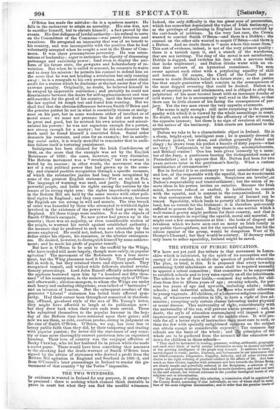THE TWO WITNESSES.
IF evidence is wanted in Ireland for any purpose, it can always be procured : there is nothing which counsel think desirable to prove in court but what they can find the needful witnesses. Indeed, the only difficulty is the too great ease of procuration, which has somewhat depreciated the value of Irish testimony,— as the privilege of petitioning in England has been overlaid by the cart-loads of petitions. In the very last case, the Crown wanted to convict Smith O'Brien—and there is a Dobbin : the counsel on the other side wanted to acquit O'Brien—and there is a Dalton. And no doubt there is "more where this came from." This sort of evidence, indeed, is not of the very primest quality : there is a tarnish upon it, and a stench of the warehouse, that are not inviting. The ring of the metal is not satisfactory. Dobbin is dogged, and twitches his face with a nervous trick that looks unpleasant ; and Dalton drinks water with an ex- cess that savours of an hysterical conscience. The men swear against each other with a perplexing equality of skill and bottom. Of course the Clerk of the Court had no reason to doubt Dobbin's belief in a future state ; so that justice has that ample guarantee which consists in the consequences of the most dogged swearing that could be desired. Dalton is a man of superior parts and attainments, and is obliged to allay the palpitation of his more tutored heart with an incessant douche of cold water • but he is uncommonly well read in the Bible, so that there can fie little chance of his facing the consequences of per- jury. Yet the two men swear the very opposite averments.
The scene is ugly enough : still more surprising is the general apathy with which it is viewed by the whole assemblage in court. No doubt, each side is angered by the effrontery of the witness in the opposite interest; but there is no sign of revulsion all round, at the nature of the testimony. Irish courts are hardened to the spectacle, Dalton we take to be a characteristic object in Ireland. He is a sharp, bright-eyed, intelligent man ; he is quaintly dressed in velveteen jacket, low shoes, and clothes generally faded and dingy ; he draws from his pocket a bundle of dirty papers—what are they ? Testimonials to his respectability, accomplishments, and Biblical studies ! One has been given formerly by a mem- ber of the Jury, a gentleman bearing the distinguished name of Pennefather ; and it appears that Mr. Dalton had been for two years private tutor in the gentleman's family. What a curious combination of circumstances !
But in Ireland it is so customary to meet associations of high and low, of the respectable with the squalid, that no wonderment was made of the present example. Suspicions are levelhe,..at Dalton's respectability and trustworthiness ; but the union of re- mote ideas in his person invites no surprise. Because the Irish mind, however refined or exalted, is habituated to consort with the squalid, and is content in the companionhood. It is to that contentment that half the misery of Ireland can be traced. Squalidity, which lends to poverty all its horrors in Eng- land, has no terrors for the Irishman: it is therefore quiescently suffered to possess the land. Really there is one service which a well-trained gentry might perform for their country, and that is to set an example in repelling the squalid, moral and material. It might cost a few assassinations at first : the looks of disgust and revulsion which we have seen cast on many an Irish family in our public thoroughfares, not for the uncouth ugliness but for the odious squalor of the group, would be dangerous ugliness, of St. George's Channel ; but they would be salutary. If decency could only learn to abhor squalidity, Ireland might be saved.


























 Previous page
Previous page